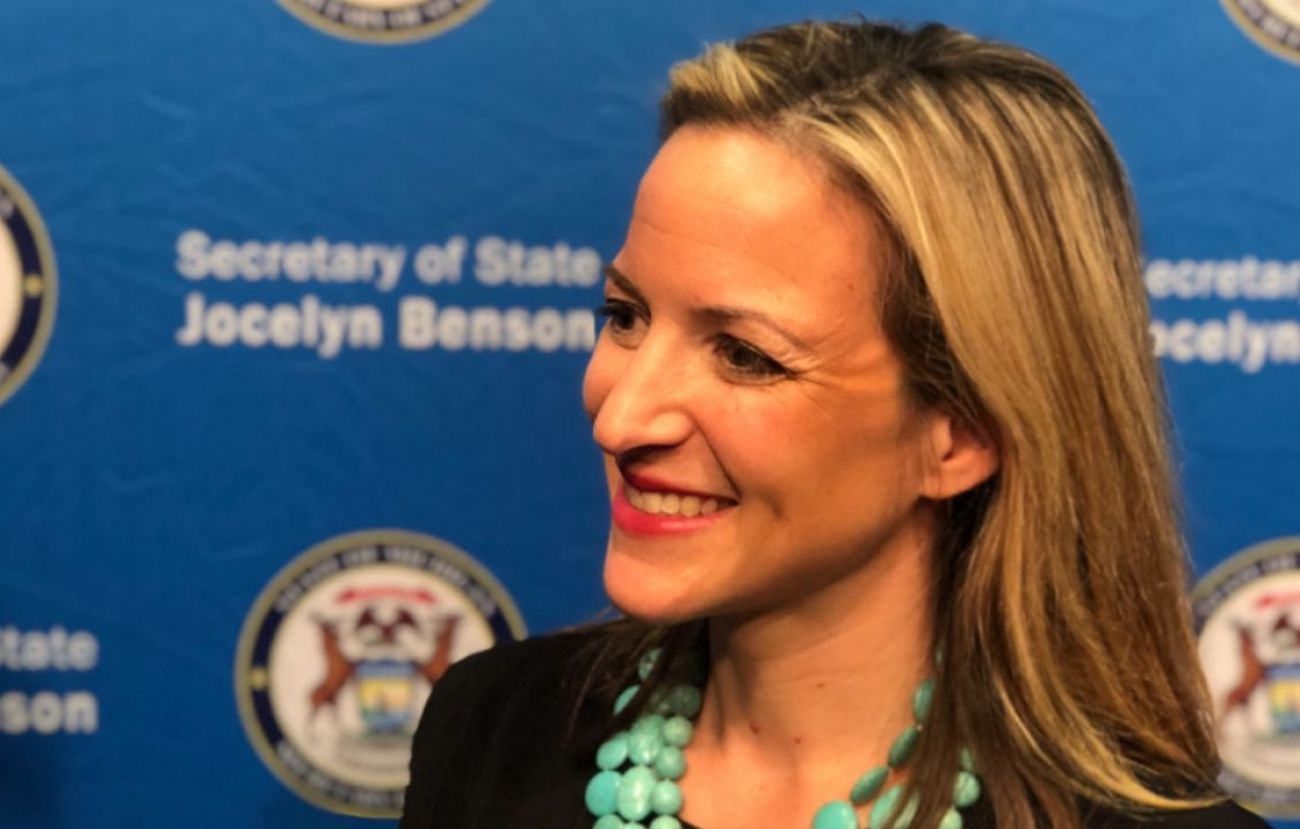Lawsuit: Jocelyn Benson allowing ‘suspiciously high’ voter registration rates

A conservative activist on Tuesday sued Michigan Secretary of State Jocelyn Benson and 16 local clerks in federal court on claims they failed to accurately maintain the state’s voter rolls.
Tony Daunt, executive director of the Michigan Freedom Fund, alleges in the suit that Leelanau County has more registered voters than adult citizens and that another 15 counties have voter registration rates over 90 percent of eligible voters, which Daunt calls “suspiciously high rates” of registration.
The findings indicate that voter rolls are inaccurate and Secretary of State Jocelyn Benson and other elections officials “are failing to make a reasonable effort” to keep the list up-to-date in accordance with the National Voter Registration Act, the suit contends. It seeks a preliminary injunction requiring the state to fix the alleged problem before the 2020 general election in November.
“Daunt reasonably fears that ineligible voters can and do vote in Michigan elections,” he wrote in the complaint.
“Those votes will dilute his legitimate vote. And Michigan’s inaccurate rolls undermine Daunt’s confidence in the integrity of Michigan elections, which also burdens his right to vote.”
Jake Rollow, spokesperson for the Department of State, told Bridge via email that it’s an attention-seeking suit “using debunked claims and bad statistics to delegitimize our elections.”
“It compares old Census data and registration numbers that make no attempt to distinguish between active and inactive registration, and asserts the false notion that voter registration rates should be low,” Rollow said, adding the state’s goal is 100 percent voter registration “as higher registration is a sign of a more robust and representative democracy.”
Michigan voters are automatically registered to vote when they apply for or update their driver’s licenses or ID cards unless they are ineligible or indicate they’d prefer not to be registered. More than 7.7 million Michiganders are registered to vote: 77 percent of Michigan’s population (including those under the age of 18).
Rollow said there is a “federally mandated delay” before some registrations are canceled and “has never been credibly linked to illegal voting on any substantial scale.”
Michigan Freedom Fund Senior Adviser Angela Meyer praised Daunt’s lawsuit in a statement Tuesday, writing that “Benson’s disregard for the law threatens the integrity of local, state and national elections.”
Concerns about voter fraud have gained renewed attention in Michigan since Benson announced in May the department plans to send absentee voter applications to all registered voters in the state’s August and November elections to make voting more accessible during the ongoing coronavirus crisis, as they did in the May elections.
Conservative leaders and groups — including from the highest office in the land — have argued this could invite fraud.
President Donald Trump falsely tweeted that Benson will send absentee ballots to Michigan voters ahead of the elections. “This was done illegally and without authorization by a rogue Secretary of State. I will ask to hold up funding to Michigan if they want to go down this Voter Fraud path!” he wrote, threatening to withhold funding for the state. He later deleted the tweet and issued a new one referencing applications.
Michigan sends absentee ballot applications to 7.7 million people ahead of Primaries and the General Election. This was done illegally and without authorization by a rogue Secretary of State. I will ask to hold up funding to Michigan if they want to go down this Voter Fraud path!
— Donald J. Trump (@realDonaldTrump) May 20, 2020
While absentee voting can open up more possibilities for fraud, there is no evidence that widespread voter fraud due to absentee voting occurs. Experts have also found that increased access to voting by mail does not substantially favor either political party.
Michigan elections officials check the signature on ballots against the signature on applications for an absentee ballot to ensure accuracy on election day. If the signatures don’t match — or the name or date of birth is wrong — the discrepancies are investigated and could invalidate the vote.
Benson told a congressional committee last week that there is not significant evidence of voter fraud in the state, but “in the rare times it does occur, we catch it and we prosecute it.”
Turnout for the May election was twice as high as in previous years, Benson told a state Senate committee Tuesday.
Ninety-nine percent of voters in that election cast their ballots by mail or in a dropbox “and there were zero reports of fraud or illness related to the election,” she said.
See what new members are saying about why they donated to Bridge Michigan:
- “In order for this information to be accurate and unbiased it must be underwritten by its readers, not by special interests.” - Larry S.
- “Not many other media sources report on the topics Bridge does.” - Susan B.
- “Your journalism is outstanding and rare these days.” - Mark S.
If you want to ensure the future of nonpartisan, nonprofit Michigan journalism, please become a member today. You, too, will be asked why you donated and maybe we'll feature your quote next time!




